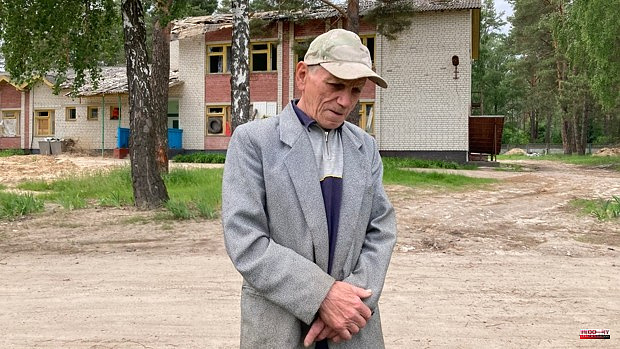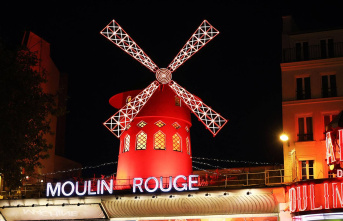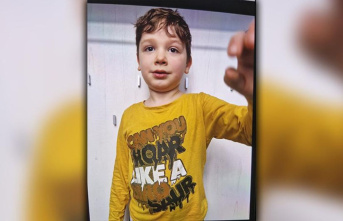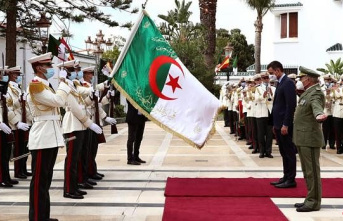Petro wanders around with his hands clasped behind his back, an elegant plaid jacket over work clothes, not daring to look up around the school. The mere presence of the building, with the playground pierced by trenches and dotted with charred military vehicles that stand out grotesquely between the swings, traumatizes the man and the rest of the neighbors. “I spend the day depressed, I ask myself over and over again why something like this had to happen to us. At least my wife and I survived », he says with infinite sadness and the astonishment of someone who still can't quite believe what happened.
It is a common feeling in Yagidne whose entire population, 360 residents, were taken as human shields and led to the school at machine gun point by the Russian troops who captured the town for almost a month.
They spent 25 days thinking "every minute" that they were going to die, that they would suffocate due to lack of oxygen, that they would die of diseases like the dozen elderly people who perished in that basement on which the Russian commander in charge of the invasion of the area had built his base, proud, sure that the presence of civilians under his feet would deter the Ukrainians from attacking him. "Two neighbors, brothers, were killed on that corner," says Petro, pointing a few meters away. In all, ten people were shot at point-blank range for defying Russian orders. Or for being Ukrainian. Nobody knows: only when they left, the neighbors found the bodies.
This is the story of an entire town under trauma, of deserted streets where the children don't laugh and the neighbors don't chat. Sadness spreads from face to face, from house to house, twinned by the absence of glass and frames, the blackened marks of the fires, the rubble that piles up in the corners and the memory that flies over every corner of Yagidne.
"We all have a hard time talking," explains Nina Guley, 68, who needs to sit on a curb to revisit what happened on March 4. «There had been a lot of fighting since the beginning of the war and the neighbors had taken refuge in our basements, when the Russians arrived in the town. They knocked door to door, they pointed guns at us and forced us to go to school. They said that if we didn't obey, they would throw a grenade at us." The families left, terrified, only to find the rest of the neighbors parading through the streets in a modern pogrom. Russian machine guns aimed at them ensured that no one resisted. They had not left their homes since late February, when the village's proximity to the Russian and Belarusian borders exposed them to direct artillery fire.
"Only in my garden there were 15 soldiers," says Valentina Shilo, 50, who when she left her house saw the village turned into a war scene. “Many soldiers and many vehicles. They came to each house and took us out by force. We took a bag with documents, the phone and some food, as recommended in the news, because we thought it would be a matter of two or three days, "recalls the woman. The procession of defenseless and confused neighbors was directed to the school, some 600 meters further on, where a kidnapping began that would only end on March 30, which included 77 children —the youngest, a month and a half baby— and dozens of elderly, including a 93-year-old man, among whom are those who died due to the lacerating conditions of the kidnapping.
The Yagidne school, where 23 children of various ages were enrolled, is today a war memorial. Between the swings, dug trenches; at the gates of each grade—kindergarten, primary, and secondary were taught—boxes of Russian military ammunition stacked in front of desks; inside the nursery, delicate children's beds painted in vivid colors with cars and animals have been placed as parapets and covered with the remains of Russian military rations and cans with rotten remains. Access to the basement where the civilians were herded is indicated by a recent graffiti, in red, on the green door: attention, children, it reads in Russian. "Fifteen steps below is the basement," details Petro. In front of the green door, on two gymnastic ponies, the poles used to block the door. In the background, the boiler room where the hostages were forced to store the corpses that their particular hell was leaving until the Russians allowed them to bury them.
"We didn't feel busy, we were prisoners. It was terrifying, first because the fighting and the explosions constantly shook the building, and second because we didn't have a place," says Valentina, a music teacher at the school. "The fire was as constant as the rain," adds Lubab, who turned 62 in full captivity. On one of the walls of the school, the impact of a projectile testifies to the ferocity of the situation. “When I arrived with my family there was no room, so we had to stay in the corridor. The cold was freezing. They only let us go out to the schoolyard in the mornings, to relieve ourselves, and the rest of the time we used buckets. The children cried and the elderly moaned in fear, composing a sinister symphony.
"As adults we could take it, but some elders were disturbed. They insisted on going home and they had to be stopped, "continues Lubab, who says that in the largest room there were 150 people crammed together. "In my room, smaller, we were 44, including eight children and 10 retirees." Without light or running water, without ventilation since there are no windows except for two skylights boarded up with wood, they spent a month “without brushing our teeth or showering”, suffering extreme hunger, thirst and cold. The hygienic conditions were so deplorable that they feared an epidemic. Many developed scabies.
The worst, they agree, was the uncertainty. In the procession that took them to school, their mobiles were taken from them, and that disconnected them from the world, leaving them at the expense of Russian disinformation. The town was unlucky enough to be on the path used by the Russians to storm Chernigov. The accesses were blown up, and the 20 kilometers that separate it from the provincial capital —before, 10 minutes by car— now involve three hours on roads, the last of which, a highway, is dotted with craters and projectiles still stuck in the ground. asphalt. "They told us that Chernigov had fallen, that Kharkov had fallen, the Ukrainian defense had collapsed, and that Zelensky had fled to France." Those who dared to ask the Russians why they were taking them hostage received the same answer. "We are freeing you from the people of Bandera," they said in reference to the nationalist leader who fought with the Nazis in World War II. "Yes, they freed us," says Valentina ironically. "They freed us from electricity, running water, asphalt and our appliances," she continues, referring to the massive looting that took place in every house in Yagidne. «They even wore panties. Who would do such a thing?” Lubab asks.
The school was immediately transformed "into the commander's headquarters," Petro continues, slurring words that are so difficult for him to pronounce. "And we were his shield, at least he had 370 shields." The explanation is poignant: the population of the village does not exceed 300 inhabitants, but dozens sought refuge there, feeling safer in the village than in the big city.
Petro, a 71-year-old farmer, is reluctant to approach the building. «No, no… I don't want to go back in», he justifies himself between fuss. "We couldn't even breathe down there. It was so crowded that we couldn't even sit down. We slept curled up on the floor, with our heads on our legs. And then there was the bombing, which never stopped."
No other neighbor had agreed to accompany ABC to the compound, whose doors have been closed by the investigators. "The children entertained themselves by painting the Ukrainian flag and writing the anthem on the walls," says Svetlana, who has not stopped shaking since she agreed to speak. "I'm still in shock. I still can't believe it. Every day I spent in that basement I thought I was going to die », she explains taking deep breaths. Inside the basement, on the margins of the green door, the neighbors wrote down the names of the dead and the day they died. There are 17 names. They also noted the calendar of his kidnapping, which begins on the 4th and ends on the 30th. Below, the phrase ours arrived on the 31st.
Then there was the interaction with the soldiers. Most of those who controlled the school were Russians, but those who walked the streets looting houses were from the Republic of Buryatia. “Many nights they arrived drunk. One of them, a Buryat, sat in front of me and demanded that I drink from his canteen. He was just thinking what could he answer so he wouldn't kill me. I told him that he didn't drink alcohol, and he turned to my neighbor, who told him that she was on medication. Her husband did drink a little, and the soldier calmed down, "continues Svetlana.
"They pointed at me in the forehead, threatening to kill me," explains Ruslan, a 47-year-old farmer. “I estimate there were 700 soldiers in the village in those days, and there was no way to escape. They told us that if anyone dared to open the cellar door, he would die. Two neighbors from another town came and executed them in the street », he continues. Valentina also believed that she was going to be killed. "One night, one came into the basement and since there was no room to move, he stuck the barrel of his gun in my stomach to get me to move away." Ruslán remembers how another came at night, loaded his gun in the middle of the residents and asked, "Can I shoot here?" Those consulted say that there were no episodes of sexual abuse "because we were very brave and refused to hand over the girls."
As the kidnapping dragged on, some sick old people began to die. At first the Russians were piling them up in the boiler room but as it filled up they decided to allow relatives to bury them in the cemetery when there was a break in the fighting. "They went in small groups to bury them," recalls Svetlana. On one occasion, fighting resumed in the middle of the funeral. "Four were injured, they came back with shrapnel wounds."
The end of hell was so sudden that they couldn't believe it, to the point that many preferred to stay one more night in the basement in case the Russians returned. “It was March 30. We heard engines moving away, and the explosions were getting more and more distant. Some men showed up and then the rest of us came out, but most of us went back for fear that they would come back and execute us all. If it was a trap and they had hidden, we were dead, "says Svetlana.
That was the moment when the mayor of Yagidne managed to arrive. «I live in another village because I am mayor of three municipalities and all three were occupied. In my village, Ivanievka, they didn't let us leave our houses, we were hostages but nothing compared to what happened to them," explains Olena Shvidka by phone. “On March 30 the Russians left Ivanievka. I tried to call Yagidne but no phone was working. The next day I decided to drive there. The distance, five minutes by car, seemed eternal due to the number of mines and projectiles that had to be avoided. "He was driving at 15 kilometers per hour," she specifies. «Upon arrival, on the first street, a couple approached, telling me through tears what had happened. They took me to the basement and I will never forget what I saw there. People were still crowded because they were afraid to go out. It was difficult to move between them as it was so crowded. At least 200 people remained locked up, including children, in unsanitary conditions. Most had scabs on their skin." According to the mayor's calculations, some 360 people were human shields of the Russian military barracks, 10 died in the basement, seven were executed in the streets and one is missing. "I don't know why they were executed, but I can explain to you why they executed my uncle, Igor Zuek, 58, who had fought with the Soviet Army in Afghanistan," she says in a deep voice. “They arrived at his house in Ivanievka and demanded that they accompany them. He said that he would not leave his house and they shot him. Later, they burned his house. My grandmother died of grief,” says Olena.
The trauma weighs like a slab in Yagidne, as in Ivanivka and in countless towns in Ukraine. “I think day and night about what happened. I can't stop spinning. Actually, I've gone out for a walk because at home I can't get it out of my head, but since I live across the street, I have no choice but to see this place every time I go out, "adds Petro, pointing to the school. The mayor promises that the building will never function as a school again, since it had already become large and outdated before what happened. It seems unthinkable that any child would be happy there, given the pain that the mere sight of him generates. "It doesn't just happen to me, the same thing happens to the rest because the traces of the war are everywhere," Petro murmurs. "How could we forget?"












